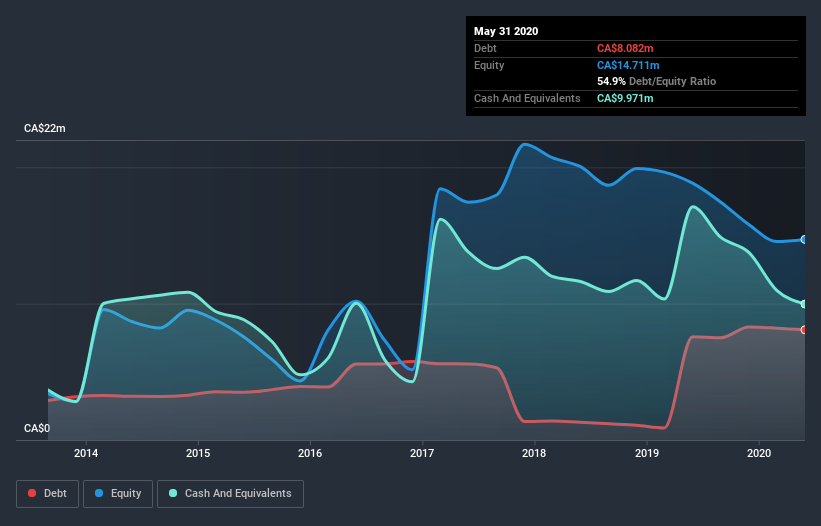Is Opsens (TSE:OPS) Using Debt In A Risky Way?

Legendary fund manager Li Lu (who Charlie Munger backed) once said, 'The biggest investment risk is not the volatility of prices, but whether you will suffer a permanent loss of capital.' When we think about how risky a company is, we always like to look at its use of debt, since debt overload can lead to ruin. As with many other companies Opsens Inc. (TSE:OPS) makes use of debt. But should shareholders be worried about its use of debt?
What Risk Does Debt Bring?
Debt is a tool to help businesses grow, but if a business is incapable of paying off its lenders, then it exists at their mercy. Ultimately, if the company can't fulfill its legal obligations to repay debt, shareholders could walk away with nothing. However, a more common (but still painful) scenario is that it has to raise new equity capital at a low price, thus permanently diluting shareholders. Of course, plenty of companies use debt to fund growth, without any negative consequences. The first step when considering a company's debt levels is to consider its cash and debt together.
Check out our latest analysis for Opsens
How Much Debt Does Opsens Carry?
As you can see below, at the end of May 2020, Opsens had CA$8.08m of debt, up from CA$7.58m a year ago. Click the image for more detail. However, its balance sheet shows it holds CA$9.97m in cash, so it actually has CA$1.89m net cash.
A Look At Opsens's Liabilities
We can see from the most recent balance sheet that Opsens had liabilities of CA$5.14m falling due within a year, and liabilities of CA$11.7m due beyond that. Offsetting these obligations, it had cash of CA$9.97m as well as receivables valued at CA$5.16m due within 12 months. So its liabilities outweigh the sum of its cash and (near-term) receivables by CA$1.7m.
Given Opsens has a market capitalization of CA$68.6m, it's hard to believe these liabilities pose much threat. But there are sufficient liabilities that we would certainly recommend shareholders continue to monitor the balance sheet, going forward. Despite its noteworthy liabilities, Opsens boasts net cash, so it's fair to say it does not have a heavy debt load! When analysing debt levels, the balance sheet is the obvious place to start. But ultimately the future profitability of the business will decide if Opsens can strengthen its balance sheet over time. So if you're focused on the future you can check out this free report showing analyst profit forecasts.
In the last year Opsens had a loss before interest and tax, and actually shrunk its revenue by 3.3%, to CA$30m. We would much prefer see growth.
So How Risky Is Opsens?
By their very nature companies that are losing money are more risky than those with a long history of profitability. And in the last year Opsens had an earnings before interest and tax (EBIT) loss, truth be told. And over the same period it saw negative free cash outflow of CA$6.3m and booked a CA$4.8m accounting loss. However, it has net cash of CA$1.89m, so it has a bit of time before it will need more capital. Overall, we'd say the stock is a bit risky, and we're usually very cautious until we see positive free cash flow. The balance sheet is clearly the area to focus on when you are analysing debt. But ultimately, every company can contain risks that exist outside of the balance sheet. Be aware that Opsens is showing 1 warning sign in our investment analysis , you should know about...
If you're interested in investing in businesses that can grow profits without the burden of debt, then check out this free list of growing businesses that have net cash on the balance sheet.
This article by Simply Wall St is general in nature. It does not constitute a recommendation to buy or sell any stock, and does not take account of your objectives, or your financial situation. We aim to bring you long-term focused analysis driven by fundamental data. Note that our analysis may not factor in the latest price-sensitive company announcements or qualitative material. Simply Wall St has no position in any stocks mentioned.
Have feedback on this article? Concerned about the content? Get in touch with us directly. Alternatively, email editorial-team@simplywallst.com.

